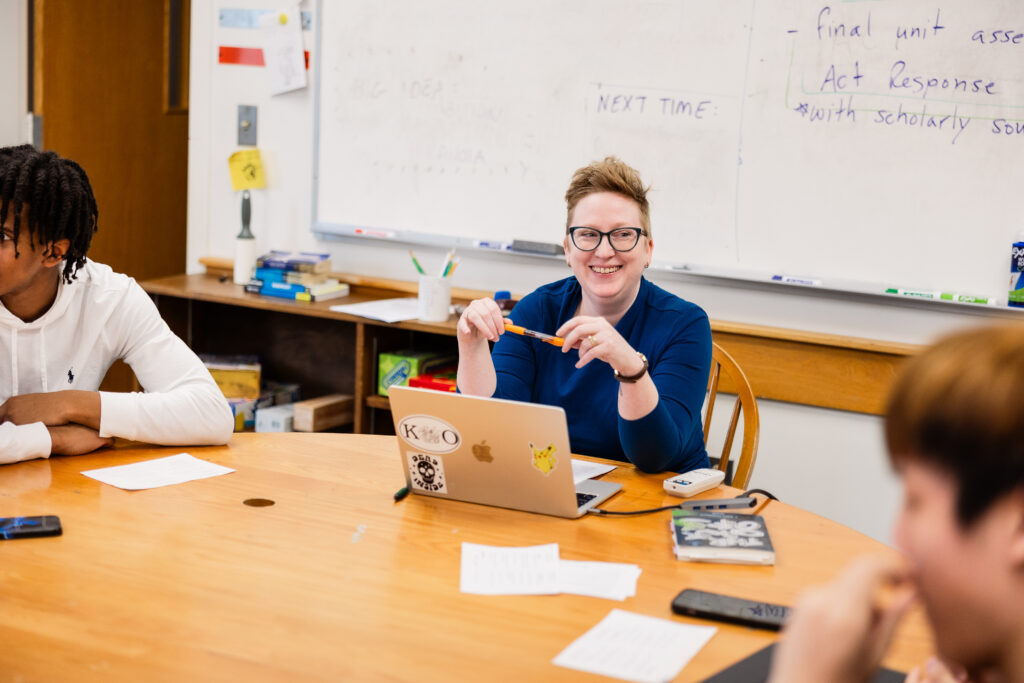Dr. Erin McQuiston

Dr. Erin McQuiston
Upper School English teacher
Centenary College of Louisiana, B.A.
University of Illinois Urbana-Champaign, M.A., Ph.D.
For Upper School English teacher Dr. Erin McQuiston, there’s a certain magic in delving into the realms of novels and poetry. It’s not just about dissecting sentences or memorizing literary terms; it’s about unraveling the essence of storytelling, something deeply ingrained in the human psyche.
When asked about her motivations for teaching literature, Ms. McQuiston emphasizes the joy of engaging in conversations about stories. “It’s just great to talk about stories. I think that’s something humans are really good at and really enjoy,” she said. For her, literature is not just a subject; it’s akin to running a book club where minds come together to explore narratives.
According to McQuiston, storytelling holds a profound significance. “In a way, it’s time travel, isn’t it?” she said. You get to go back to the past or imagine the future and really get into other people’s brains.” Through stories, students can cultivate empathy and understanding, stepping into the shoes of characters vastly different from themselves. By reading novels, students get to think outside their own narrow experience and consider other points of view and emotional realities.
Teaching literature isn’t without its challenges, particularly when navigating the complexities and nuances of characters and themes. McQuesiton encourages the students to embrace the intricacies of human nature, even those unlikeable characters in The Great Gatsby. “The casual cruelty of the rich is expressed in a beautifully concise way,” she said.
One of McQuesiton’s favorite teaching moments involves a poetry unit where students engage with the world around them. She brings prosaic items like yard scraps, pine cones, a rock, and a feather into class and places them in a brown paper bag. The students select a bag and then describe the items using adjectives and gerunds, surreptitiously slipping in a grammar lesson in the process. This hands-on approach enhances their writing skills and fosters a deeper connection with nature and creativity.
McQuiston teaching philosophy revolves around flexibility and engagement. She embraces spontaneity, allowing some lessons to evolve organically based on students’ interests and energy levels. McQuiston recognizes the importance of making learning meaningful in a world where students are inundated with schedules and obligations. “Not everything has to be for a grade to be worthwhile,” she asserts. By elevating the minutiae of everyday life into something beautiful, she encourages her students to find joy and creativity in learning.
McQuiston stresses the value of roundtable discussions as a way to build community in class as well as public speaking skills. She encourages each student to share their thoughts verbally, and she believes that hearing others speak formally elevates the level of conversation.
McQuiston’s passion for literature is contagious, reminding us of the power of storytelling to inspire, educate, and transform lives. In her classroom, literature isn’t just a subject—it’s a gateway to endless possibilities, where imagination knows no bounds and every word holds the promise of a new adventure.
Favorite hobbies: quilting, cross-stitch, pottery. Legos
Favorite music: classic hip-hop and country music
Favorite food : Thai or hot pot
Favorite show: The Good Place

"It's time travel, isn't it? You get to go back to the past or imagine the future and really get into other people's brains.”

